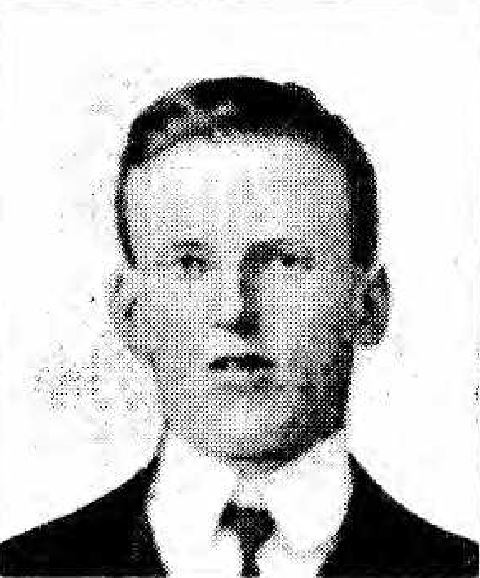Rfn
John William Chadwick
Information about birth
|
Date of birth: 28/07/1889 |
|
Place of birth: Ecclesall, Yorkshire, England, United Kingdom |
General information
|
Profession: Coach Painter |
Army information
|
Country: England, United Kingdom |
|
Force: British Expeditionary Force |
|
Rank: Rifleman |
|
Service number: 307712 |
|
Enlistment date: 16/02/1916 |
|
Enlistment place: Sheffield, Yorkshire, England, United Kingdom |
|
Units: — West Yorkshire Regiment (Prince of Wales's Own), 1/8th Bn. (Leeds Rifles) (Last known unit) |
Information about death
|
Date of death: 09/10/1917 |
|
Place of death: Yetta Houses, Zonnebeke, Belgium |
|
Cause of death: Killed in action (K.I.A.) |
|
Age: 28 |
Memorial
|
Tyne Cot Memorial Panel: 44 |
Distinctions and medals 2
|
British War Medal Medal — 05/01/1920 |
|
Victory Medal Medal — 05/01/1920 |
Points of interest 2
| #1 | Place of birth | ||
| #2 | Enlistment place |
My story
John William Chadwick was a 28-year old Coach Painter from Sheffield, West Riding of Yorkshire, who was killed in the Battle of Passchendaele. He served as a Rifleman in the West Yorkshire Regiment (Prince of Wales's Own), 1/8th (Leeds Rifles), part of the 146th Brigade of the 49th (West Riding) Division.
John took part in the operations at Ypres, and was gassed on 26-27 July 1917. He rejoined his regiment and participated in the attack of 9 of October 1917, known as the Battle of Poelcapelle. The Division’s attack was carried by the 148th Brigade on the right and the 146th Brigade on the left. The latter deployed the 1/5th, 1/7th and 1/8th West Yorkshire Regiment Battalions during the attack, the 1/6th was kept in reserve.
The 1/8th Battalion advanced from positions South of Gravenstafel towards the hamlet Wallemolen, South of the village of Poelcapelle, at zero hour, 5.20 a.m. “B” and “C” Companies were to capture the first objective. A line near Yetta Houses. “A” and “D” Companies were to move through the line at Yetta Houses and consolidate a line near the Wallemolen Cemetery. The Battalion marched the whole night and arrived only five minutes before the sign was given to attack. Machine-gun and rifle bullets swept the line of advance and casualties soon became very heavy. Especially among officers and N.C.O.’s the losses were severe. The unforgiving German machine-gun and rifle fire was so heavy that the 1/8th Battalion could only advance about 300 yards. Battalion Headquarters were established in Kronprinz Farm and the men dug in around the Farm. They held this position tenaciously till the next day, when they were relieved.
The 1/8th Battalion suffered heavy casualties . Out of twenty-three officers who joined the attack, ten were killed, eight were wounded and one went missing. The other ranks suffered 301 casualties, wounded, killed or missing. John William Chadwick fell during the Battalion’s attack on Yetta Houses, during the Battle of Poelcapelle on the 9th of October 1917. John has no known grave and is now remembered on the Tyne Cot Memorial.
John took part in the operations at Ypres, and was gassed on 26-27 July 1917. He rejoined his regiment and participated in the attack of 9 of October 1917, known as the Battle of Poelcapelle. The Division’s attack was carried by the 148th Brigade on the right and the 146th Brigade on the left. The latter deployed the 1/5th, 1/7th and 1/8th West Yorkshire Regiment Battalions during the attack, the 1/6th was kept in reserve.
The 1/8th Battalion advanced from positions South of Gravenstafel towards the hamlet Wallemolen, South of the village of Poelcapelle, at zero hour, 5.20 a.m. “B” and “C” Companies were to capture the first objective. A line near Yetta Houses. “A” and “D” Companies were to move through the line at Yetta Houses and consolidate a line near the Wallemolen Cemetery. The Battalion marched the whole night and arrived only five minutes before the sign was given to attack. Machine-gun and rifle bullets swept the line of advance and casualties soon became very heavy. Especially among officers and N.C.O.’s the losses were severe. The unforgiving German machine-gun and rifle fire was so heavy that the 1/8th Battalion could only advance about 300 yards. Battalion Headquarters were established in Kronprinz Farm and the men dug in around the Farm. They held this position tenaciously till the next day, when they were relieved.
The 1/8th Battalion suffered heavy casualties . Out of twenty-three officers who joined the attack, ten were killed, eight were wounded and one went missing. The other ranks suffered 301 casualties, wounded, killed or missing. John William Chadwick fell during the Battalion’s attack on Yetta Houses, during the Battle of Poelcapelle on the 9th of October 1917. John has no known grave and is now remembered on the Tyne Cot Memorial.
Sources 3
|
1/8 Battalion West Yorkshire Regiment. (The National Archives, KEW (TNA), WO 95/2795/2). https://discovery.nationalarchives.gov.uk/details/r/C14303 Further reference |
|
McCarthy C., The Third Ypres Passchendaele. The Day-by-Day Account, (London, Arms & Armour Press, 1995), pg. 107-108. Sources used |
|
Wyrall E., The West Yorkshire Regiment in the War 1914-1918 Volume Two, (London, John Lane The Bodley Head LTD, 1927), pg. 122-126. Sources used |
More information 3
|
Commonwealth War Graves Commission Database https://www.cwgc.org/find-records/find-war-dead/casualty-details/1628388 |
|
Namenlijst (In Flanders Fields Museum) https://namenlijst.org/publicsearch/#/person/_id=e15b106c-da31-4776-b355-d319deff2885 |
|
Lives of the First World War (Imperial War Museum) https://livesofthefirstworldwar.iwm.org.uk/lifestory/759798 |
